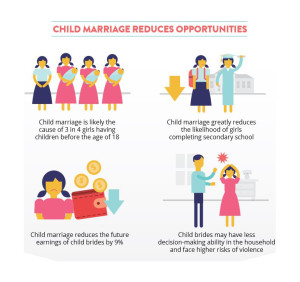Climate Change and the Threat to the Rights of Girls
Feb 12th, 2020 | By admin | Category: Youth RightsBy Suzanne York.
Imagine being a small-scale farmer in a developing country, trying to grow crops in challenging conditions that farmers have faced for generations. Then increasingly severe climate impacts really start to throw things out of whack. Droughts, floods, and erratic weather conditions threaten livelihoods and the ability to provide adequate amounts of food for your family or to sell to market.The day comes when you have nothing to show for your efforts. Faced with bleak options, you decide to marry your young daughter off to someone willing to pay a bride price.
Or imagine another scenario. This time you are a 12-year-old girl in a poor country that has been enduring a long drought and the price for staple foods has doubled in the past year. You sell the one thing you have to pay for food – your body.
Climate-driven Marriages
If you think these two scenarios sound unrealistic, then you haven’t been paying much attention to world news. Both of the above situations were reported in recent news stories. In Afghanistan, climate change is exacerbating diverse problems, from food insecurity to ethnic conflicts. Experts there report that “drought, flood, avalanches, landslides, extreme weather, mass displacement, conflict, and child marriage—all of which already plague Afghanistan—are set to worsen.”
So the solution available to people with little to their names is marrying off children, which has been reported as occurring in a number of other countries, such as Mozambique and Bangladesh.
Read this extensive article from a few years ago in The Guardian, for excellent coverage of this troubling issue. Here’s an excerpt:
It was the flood that ensured that Ntonya Sande’s first year as a teenager would also be the first year of her married life. Up to the moment the water swept away her parents’ field in Kachaso in the Nsanje district of Malawi, they had been scraping a living. Afterwards they were reduced to scavenging for bits of firewood to sell.
So when a young man came to their door and asked for the 13-year old’s hand in marriage, the couple didn’t think about it for too long, lest he look elsewhere. Ntonya begged them to change their minds. She was too young, she pleaded. She didn’t want to leave. But it was to no avail. Her parents sat her down and spelled it out for her: the weather had changed and taken everything from them. There was not enough food to go around. They couldn’t afford another mouth at the table.
Sex for Food
In southern Africa, where many countries have experienced their lowest rainfall since 1981, girls as young as the age of 12 are selling sex to buy food for themselves and their families. In Angola, according to World Vision, girls sell themselves for as little as 40 cents to feed their families as the south of the country faces its worst drought in four decades. Aid workers have seen a rise in girls resorting to transactional sex in Angola and Zimbabwe amid “huge levels of desperation”. The same goes for Mozambique and Malawi, where officials with ActionAid say women and girls “on the edge of survival” were forced into transactional sex.
In addition to child marriage and prostitution, rape too is on the rise, as young girls are often the ones sent to fetch water for the family. Droughts force them to have to go further distances, sometimes at night and often alone, putting them at great risk of sexual violence.
Solutions We Can Implement Today
There are solutions that can be prioritized right now. The top two are investing in family planning / reproductive rights and educating girls.
The contributors of the best selling book, Drawdown: The Most Comprehensive Plan Ever Proposed to Reverse Global Warming, realized the importance of these issues. Their top solutions to climate change put girls’ education as solution number six and family planning as solution number seven.
Drawdown’s authors suggests that investing in family planning, combined with girls’ education, could save 123 gigatons of carbon dioxide and be a cost-effective solution. It’s a sensitive comparison, linking reproductive rights and human rights with carbon emissions. And while Drawdown recognized that it’s inappropriate to monetize a human right, it still effectively addressed the connection between girls’ education and climate change.
Investing funds in support of girls education and keeping them in school, along with access to voluntary family planning services and sex ed, are efforts that people, governments and civil society should promote. The benefits of keeping a girl child in school are transformative – for the girl, for her community and for the world. See The Top 10 Reasons to Support Girls’ Education.
In terms of addressing climate change, educating girls (and boys too, of course) and family planning services are easier and cheaper solutions than say, transitioning off of fossil fuels.
Another effective approach is peer to peer outreach.
UNICEF highlighted a story about Smriti, a young Bangladeshi female activist who talks to people in her community about the impacts of climate change on gender and the link to child marriage. She hopes to deter families from forcing their daughters into marriage. As told to UNICEF, Smriti talks with “parents, students and children throughout the region, often visiting schools to make sure children are aware of their rights. Smriti also speaks with people who themselves were married as a child and asks them to share their stories. This can help others realise the dangers of the practice.”
We need more people with Smriti’s drive and dedication in the world.
Suzanne York is Director of Transition Earth.

![[Photo: https://commons.wikimedia.org/wiki/File:Farmer_works_a_field_of_beans,_Nicaragua.jpg]](http://populationgrowth.org/wp-content/uploads/2020/02/Farmer_works_a_field_of_beans_Nicaragua-300x200.jpg)

![[Photo: https://commons.wikimedia.org/wiki/File:Escaping_child_marriage_(14521096630).jpg]](http://populationgrowth.org/wp-content/uploads/2020/02/Escaping_child_marriage_14521096630.jpg)